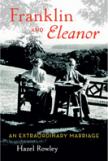In Lasting Partnership
On Sept. 12, 1918, the “bottom dropped out” of Eleanor Roosevelt’s world. She had just discovered a stack of love letters from Lucy Mercer tucked in the luggage of Franklin Delano Roosevelt, her husband of 14 years. Eleanor offered Franklin a divorce, asking him, however, to consider the effects on their five children and insisting he never see Mercer again. Meanwhile, his mother, Sara Roosevelt, threatened disinheritance and his political advisor, Louis Howe, warned of the end of a promising political career. Franklin and Eleanor chose to remain together, forging a new approach to their relationship and creating a marriage unusual for their time and one of the most written about in American history.
In Franklin and Eleanor: An Extraordinary Marriage, Hazel Rowley (most recently the chronicler of the relationship of Simone de Beavoir and Jean-Paul Sartre) acknowledges that the Mercer affair caused a shift in the emotional life of Eleanor and Franklin, but it was not the most important catalyst in their political marriage. Franklin’s struggle with polio and Eleanor’s determination to manage his future were the main events that drove these two passionate political figures to shape their marriage consciously in radical ways. Despite Franklin’s stint as a New York state senator and as assistant secretary of the Navy, his bout with polio and its aftermath made him into a different, more serious politician. Eleanor, too, escalated her public role well beyond dabbling in teaching and a speech or two on the local campaign trail.
Together, deftly directed by Louis Howe, they forged F.D.R.’s return to politics. F.D.R. acquired the polio rehabilitation center Warm Springs, practiced “walking” for hours, and in 1924, on the arm of his son James, moved to the podium to speak as the crowd of Democratic conventioneers in Madison Square Garden cheered. Four years later he was barnstorming across New York on his own behalf as the Democratic candidate for governor.
Eleanor was no less busy. Urged on by Howe, who told F.D.R. “your Missus is gaining in political wisdom every day,” she spoke at fundraisers, started and edited the monthly magazine Women’s Democratic News and generally kept “politics alive in the Roosevelt household and the family name in front of the public” while establishing herself as a political force. From that point on, the marriage worked, albeit in a different fashion than either might have earlier imagined.
Rowley chronicles this new marital course as the Roosevelts moved into the governor’s mansion, launched the 1932 presidential campaign and governed through the Depression and war years. In this lightly limned historical account, Rowley moves between Eleanor and Franklin. F.D.R.’s entourage of companions after Mercer included his devoted secretary Missy LeHand, his fun-loving distant cousin Daisy Suckley and the adoring Princess Martha of Norway. In the early years, Eleanor found encouragement and support from Nancy Cook and Marion Dickerman, later from her “dashing and chivalrous” driver, Earl Miller, and especially from the hard-driven journalist Lorena Hickok. Yet F.D.R. continued to rely on Eleanor for political advice and motivation, liked her friends, invited them to Hyde Park and encouraged their activities at Val-Kill. Eleanor used her own considerable talents on Franklin’s behalf, gained a political voice of her own, was admired for her “superb courage and determination” and, for the most part, liked Franklin’s companions. They were deeply fond of one another. Franklin always addressed Eleanor as “Dearest Babs” and sent “much love”; Eleanor’s sentiments were the same.
Theirs was an “extraordinary marriage” for more than 40 years. It was, at least at its inception, a “Victorian marriage” as well, according to Rowley. Eleanor once told her daughter Anna that sex was “a burden to be borne,” and for most Victorian women that would have rung true. Eleanor Roosevelt bore four children during her first four-and-a-half years of marriage, and she was nearly six months pregnant while running the gamut of the Washington political scene when Franklin was working in the Navy Department and while she was managing family moves between Hyde Park, Washington and Campobello, the summer home in Maine. Eleanor’s words were not so much prudish as realistic.
Whether her frequent pregnancies or the Lucy Mercer affair interrupted the Roosevelts’ sex life or whether friendships turned into trysts or companionships were sexual are less important questions than the part Franklin and Eleanor played in the course of American history. Regardless of the role of various people in their lives or even the nature of their marriage, Franklin and Eleanor together laid a new path for American democracy in the 20th century.
The serious follower of the Roosevelts, of course, will have read Joseph Lash, Blanche Wisen Cook, Geoffrey Ward, Doris Kearns Goodwin and Jean Edward Smith, among others, and even Jonathan Daniels’s 1966 revelation of the Mercer affair and Joseph Persico’s more recent (some would say, salacious) tale of the women in F.D.R.’s life. For the beginner, Hazel Rowley’s Franklin and Eleanor: An Extraordinary Marriage is a short, readable account filled with familiar characters and anecdotes. It is briefer than Lash, Cook, Ward, Goodwin or Smith and more balanced than either Daniels or Persico.
Perhaps the last words on their marriage should be Eleanor’s. Writing in her autobiography that she learned the lessons of “adaptability and adjustment and finally of self-reliance,” she believed that she and Franklin “had come through the years with an acceptance of each other’s faults and foibles, a deep understanding, warm affection, and agreement on essential values,” values that sustained not only the Roosevelts, but all Americans.
This article also appeared in print, under the headline “In Lasting Partnership,” in the May 16, 2011, issue.








